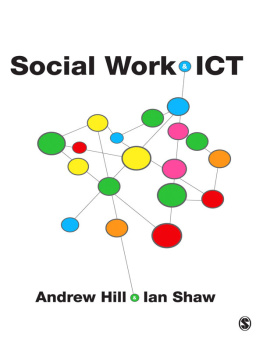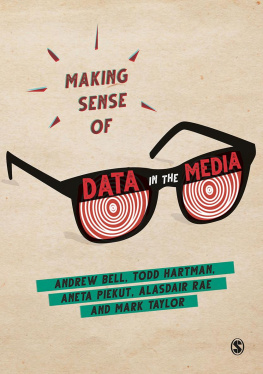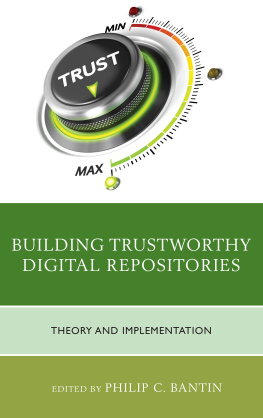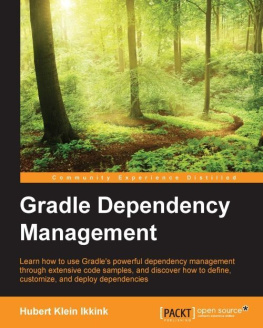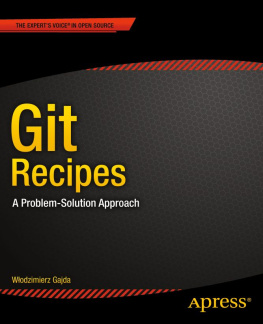Andrew Wesolek. - Making Institutional Repositories Work
Here you can read online Andrew Wesolek. - Making Institutional Repositories Work full text of the book (entire story) in english for free. Download pdf and epub, get meaning, cover and reviews about this ebook. year: 2017, publisher: Purdue University Press, genre: Politics. Description of the work, (preface) as well as reviews are available. Best literature library LitArk.com created for fans of good reading and offers a wide selection of genres:
Romance novel
Science fiction
Adventure
Detective
Science
History
Home and family
Prose
Art
Politics
Computer
Non-fiction
Religion
Business
Children
Humor
Choose a favorite category and find really read worthwhile books. Enjoy immersion in the world of imagination, feel the emotions of the characters or learn something new for yourself, make an fascinating discovery.
- Book:Making Institutional Repositories Work
- Author:
- Publisher:Purdue University Press
- Genre:
- Year:2017
- Rating:3 / 5
- Favourites:Add to favourites
- Your mark:
- 60
- 1
- 2
- 3
- 4
- 5
Making Institutional Repositories Work: summary, description and annotation
We offer to read an annotation, description, summary or preface (depends on what the author of the book "Making Institutional Repositories Work" wrote himself). If you haven't found the necessary information about the book — write in the comments, we will try to find it.
Making Institutional Repositories Work — read online for free the complete book (whole text) full work
Below is the text of the book, divided by pages. System saving the place of the last page read, allows you to conveniently read the book "Making Institutional Repositories Work" online for free, without having to search again every time where you left off. Put a bookmark, and you can go to the page where you finished reading at any time.
Font size:
Interval:
Bookmark:

Repositories Work
Making Institutional Repositories Work sums it up very well. This book, the first of its kind, explains how IRs work and how to get the greatest results from them. As many of us know, numerous IRs launched with high hopes have in fact languished with lackluster results. Faculty have little interest, and administrators see little promise. But the many chapter authors of this very well edited book have made their IRs successful, and here they share their techniques and successes. This is a necessary book for anyone contemplating starting an IR or looking to resurrect a moribund one.
Richard W. Clement
Dean, College of University Libraries & Learning Sciences
University of New Mexico
This volume presents an interesting cross-section of approaches to institutional repositories in the United States. Just about every view and its opposite makes an appearance. Readers will be able to draw their own conclusions, depending on what they see as the primary purpose of IRs.
Stevan Harnad
Professor, University of Qubec at Montral
& University of Southampton
Approaching this volume as one of those of us who have been furiously working to cultivate thriving repositories, I am very excited about what this text represents. It is a broad compilation featuring the best and brightest writing on all the topics Ive struggled to understand around repositories, and it also marks a point when repository management and development is looking more and more like a core piece of research library work. Callicott, Scherer, and Wesolek have pulled together all the things I wished Id been able to read in my first year as a scholarly communication librarian. As I tweeted while reading a review copy: To my #scholcomm colleaguesthe forthcoming Making Institutional Repositories Work will be essential.
Micah Vandegrift
Digital Scholarship Coordinator
Florida State University Libraries
Whether your IR is new, you are new to an IR, or you want to learn how other institutions are successful in specific areas, Making Institutional Repositories Work offers valuable and practical guidance. Each topic is addressed from multiple angles, as 39 authors share a range of varied experiences with selecting platforms, adopting policies, recruiting content, understanding metrics, and more. All readers are likely to see their own academic library within these pages. Making Institutional Repositories Work is a book I wish had been available when I launched an IR a few years ago.
Janelle Wertzberger
Assistant Dean and Director of Scholarly Communications
Gettysburg College
Making Institutional Repositories Work should be required reading for any librarian involved in the establishment of an institutional repository. Covering fundamental topics such as platform selection and policy creation, this book can help new repositories start with a clear plan for success. It will also be a welcome addition to the shelves of seasoned IR managers, as its thoughtful thematic sections and case studies provide real-world approaches to assess, sustain, and improve repositories on any campus.
Andrea Wright
Science & Outreach Librarian, University Copyright Officer
Furman University
Institutional repositories manage and provide access to the results and products of research. And, when networked, repositories collectively represent a key component of the evolving global open science infrastructure. As the momentum for open access grows and universities take on greater responsibility for managing their research outputs, the role of repositories is, equally, gaining in importance. This book provides a valuable overview of the current trends in institutional repository services and offers helpful guidance in terms of addressing challenges and adopting best practices from key North American experts in the field.
Kathleen Shearer
Executive Director, Confederation of Open Access Repositories
Charleston Insights in Library, Archival, and Information Sciences Editorial Board
Shin Freedman
Tom Gilson
Matthew Ismail
Jack Montgomery
Ann Okerson
Joyce M. Ray
Katina Strauch
Carol Tenopir
Anthony Watkinson
Repositories Work
Edited by Burton B. Callicott, David Scherer, and Andrew Wesolek
Charleston Insights in
Library, Archival, and Information Sciences
Purdue University Press
West Lafayette, Indiana
Copyright 2016 by Purdue University. All rights reserved.
Printed in the United States of America.
Library of Congress Cataloging-in-Publication Data
Names: Callicott, Burton B., 1968- editor. | Scherer, David, 1984- editor. | Wesolek, Andrew, 1983- editor.
Title: Making institutional repositories work / edited by Burton B. Callicott, David Scherer, and Andrew Wesolek.
Description: West Lafayette, Indiana : Purdue University Press, [2016] | Series: Charleston insights in library, archival, and information sciences | Includes bibliographical references and index.
Identifiers: LCCN 2015035810 | ISBN 9781557537263 (pbk. : alk. paper) | ISBN 9781612494227 (epdf) | ISBN 9781612494234 (epub)
Subjects: LCSH: Institutional repositories. | Institutional repositoriesUnited StatesCase studies.
Classification: LCC ZA4081.86 .M35 2016 | DDC 025.04dc23 LC record available at http://lccn.loc.gov/2015035810
With institutional repositories well into their second decade of deployment, the sort of examination of where we have been, where we are, and where we might be going represented by the essays in Making Institutional Repositories Work feels very timely.
In early 2003 I published an article titled Institutional Repositories: Essential Infrastructure for Scholarship in the Digital Age, where I tried to make the case that such services most essentially provide a framework (often, perhaps, of last resort) to manage, provide access to, and preserve new forms of digital scholarship otherwise at risk, to nurture innovation in forms of scholarly communication, and to facilitate the preservation and reuse of evidence underlying scholarly work. This vision stands in contrast to a well-articulated alternative view that casts institutional repositories first and primarily as mechanisms to support a transition of the traditional scholarly journal literature to open access models.
This dialecticstill unresolvedis well illustrated in the chapters of this volume. There is much coverage of the relationships between repositories and various developments that have advanced the cause of open access. One very nice property of this approach is that its actually possible to measure progress toward success quantitatively, as opposed to the subjective assessments and very long view of nurturing new forms of scholarship. I was delighted to see coverage of the repositories in the context of electronic theses and dissertations (ETDs), but this discussion also underscores how long it takes for changes in practice to enter the mainstream in the academy: ETDs are now well into their third decade.
The importance of research data has only really received the serious attention it demands in the last decade, and various funder mandates surrounding the availability and reuse of data are just now taking hold, at least in the United States. It remains to be seen how we will ultimately find balances between the roles of disciplinary and institutional repositories in managing research data, discipline by discipline. For many purposes, I continue to suspect that disciplinary approaches are superior
Font size:
Interval:
Bookmark:
Similar books «Making Institutional Repositories Work»
Look at similar books to Making Institutional Repositories Work. We have selected literature similar in name and meaning in the hope of providing readers with more options to find new, interesting, not yet read works.
Discussion, reviews of the book Making Institutional Repositories Work and just readers' own opinions. Leave your comments, write what you think about the work, its meaning or the main characters. Specify what exactly you liked and what you didn't like, and why you think so.



